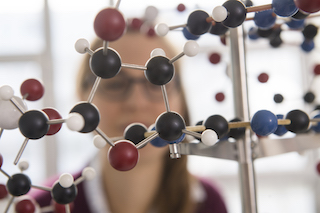Big Data Analytics
Contents
The lecture Big Data Analytics develops competencies in performing data mining tasks on very large amounts of data that cannot be stored in main memory. The lecture provides the key ideas of similarity search using minhashing and locality-sensitive hashing, of data stream processing where data arrives so fast that it has to be processed immediately or is otherwise lost, of Web-related algorithms such as Google's PageRank, of algorithms for mining frequent itemsets, association rules and frequent subgraphs, of algorithms to analyze the structure of large graphs such as social network graphs, and of the map-reduce principle to design parallel algorithms.
- Finding Similar Items
- Stream Data Analysis
- PageRank
- MapReduce
- Mining Frequent Itemsets
- Mining Frequent Subgraphs
- Mining Social Network Graphs
- Recommender Systems
This class will be taught online, through video lectures.
Important Links
Literature
- A. Silberschatz, H. F. Korth, S. Sudarshan, „Database System Concepts“, 5th edition, McGraw Hill, 2006.
- R. Elmasri und S.B. Navathe, „Fundamentals of Database Systems“, 5th edition, Pearson/Addison Wesley, 2007.
- William H. Inmon, “Building the Data Warehouse”, John Wiley & Sons, 1996.
- Jure Leskovec, Anand Rajaraman, Jeffrey David Ullman, “Mining of Massive Datasets”, 2nd Edition, Cambridge University Press, 2014.
- Tom White, “Hadoop: The Definitive Guide Storage and Analysis at Internet Scale”, 3rd edition, O'Reilly.
- Viktor Mayer-Schönberger , Kenneth Cukier , “ Big Data: A Revolution That Will Transform How We Live, Work and Think”, John Murray, 2013.
- Eric Redmond , Jim R. Wilson, “Seven Databases in Seven Weeks: A Guide to Modern Databases and the NoSQL Movement”, O' Reilly, 2012.
- Peter Gulutzan, Trudy Pelzer , “SQL Performance Tuning”, Addison Wesley, 2002.
Time table
| Date | Topic |
| 23.04.2020 | Introduction / Organization / Schedules ( slides ) |
| 30.04.2020 | Finding Similar Items I ( slides) |
| 07.05.2020 | Finding Similar Items II ( slides) |
| 14.05.2020 | Map Reduce I ( slides) |
| 21.05.2020 | no lecture |
| 28.05.2020 | Map Reduce II ( slides) |
| 04.06.2020 | Map Reduce III / Mining Data Streams I ( slides) |
| 11.06.2020 | no lecture |
| 18.06.2020 | Mining Data Streams II / Link Analysis I ( slides) |
| 25.06.2020 | Link Analysis II ( slides) |
| 02.07.2020 | Frequent Itemsets I ( slides) |
| 09.07.2020 | Recommendation Systems ( slides) |
| 16.07.2020 | Mining Data Streams III / Frequent Itemsets II (slides) |
Examination dates
1st Exam: Written exam on Thursday, September 03, 2020 08:00-11:00 in the Stadthalle
2nd Exam: Written exam on Monday, September 28, 2020 12:00-14:30 in H2 and H4

